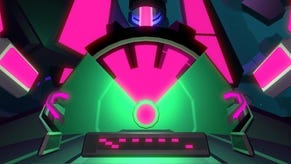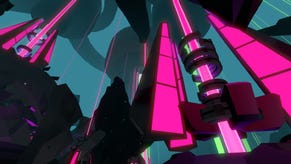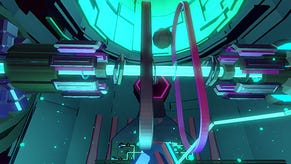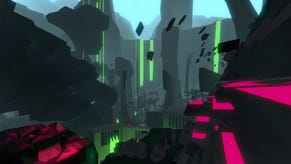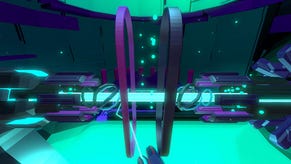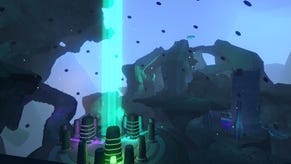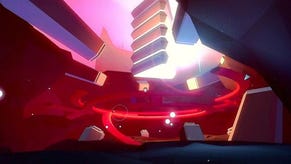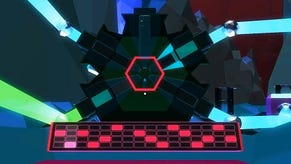A Chat With Fract Creator, Mr Flanagan
The beta test of Fract seems to have gone down rather well. The game is a peculiarly beautiful mix of Tron, Myst, and musical puzzles, and has an atmosphere that is entirely its own. I decided to have a chat with its creator, Richard E Flanagan, and find out what makes him tick.
RPS: Hello! Who are you and what are your goals in game-creation?
Flanagan: Hello indeed! I'm Richard E Flanagan, a diehard Montrealer that loves games, typography, paper-arts, and awkward social moments. I love to make things, and have been doing so professionally for roughly a decade as an art director and graphic designer for print, web, branding and advertising. But right now I'm trying to crack into the industry that I truly have a passion for, games.
My ultimate goal as an aspiring game designer is to be proud of what I do at the end of the day. More specifically, I'm really fascinated with the way that game designers can communicate ideas through their work. I want to design games that involve and implicate users while communicating context, themes, and narrative in ways that only games (and no other medium) can.
RPS: What is Fract? And when do you expect the final version to be available?
Flanagan: FRACT is a very personal project, the result of a lot of ideas that have been evolving for some time. It was originally developed as a prototype for my final project for school in the summer. After graduating, I was compelled to bring it to a more complete form, for my personal satisfaction and as a learning experience. I wanted to create a world in which I myself could explore and enjoy. This would bring together ideas of early computer culture, adventure games and fundamentals of electronic music (all things I hold close to my heart). I was trying to build a world where the user could experience aspects of electronic music through exploration and play. These experiences would later allow the user to make relevant connections using the tools they've uncovered and mastered. Oh, and I also wanted an excuse to build enormous laser-powered hyper-aggressive synaesthetic sequencers.
The beta version is only a slice of what I originally envisioned for FRACT. There are more worlds and puzzles I have mapped out, and in some cases, already designed. As for the final version, I had never imagined that I would be able to take it much further than its current state. Hopefully, if there's enough support for the idea, I will continue to work on and expand the FRACT universe (so let me know!).

RPS: Can you tell us a bit about what inspired the game?
Flanagan: I'm sure it's no surprise that both Disney's original TRON and Cyan's Myst played a big role in art direction, world design and game mechanics. The first time I saw TRON was actually a profound experience (bear with me!) and while I'm the first to admit that it's far from Shakespeare, it was the first time I had seen such a completely actualized imaginary world, and the style has influenced my work ever since (I'm sure a couple of frustrated creative directors would agree). Besides Myst and TRON, there were a lot of influences stemming from graphic design: data visualization, typography, interfaces, among others. And, of course, electronic music, especially analog culture.
RPS: What have been the most difficult aspects of creating Fract?
Flanagan: As I am not, by any means, a programmer, there were a lot technical hurdles I faced in implementing my ideas. I had to scale down or leave out some of the things I originally had envisioned for the world of FRACT. It was my first experience using Unity, and there was definitely a big learning curve. Admittedly, some of the solutions I implemented were not perfect, due to my lack of experience and knowledge of ideal techniques. Trying to execute my artistic vision within these technical restraints was undoubtedly a challenge. In the end, I had to play to my strengths while trying to work around my shortcomings. But this resulted in some interesting creative choices - it's amazing what you can come up with when you're backed into a corner!

RPS: Why do you think are there so few first-person puzzle games?
Flanagan: First-person puzzle games are a subset of a genre that is struggling for attention, which is unfortunate. I grew up playing the classic LucasArts and Sierra titles with my family, and have some of my favorite gaming memories from these adventure games. Whether this is because there is no demand for such games, or whether developers just aren't interested in making them anymore, I'm not sure. We've come a long way with games, especially in terms of technology. I think it's natural that with all these advances we want to offer gamers the most cutting edge technology, most realistic graphics, communal experiences, or sophisticated mechanisms. We forget that something as simple as a puzzle can still be very satisfying, even rewarding.
Also, I believe there are also some very real challenges to making first-person puzzle games work well. Designers have very little control over how the player interacts within their world. While this loss of control can make designing effectively balanced puzzles more difficult, I think the payoff is potentially greater, as players can feel more implicated, and consequently more empowered in discovering solutions. Frictional Games is a notable example of a developer that has really mastered creating contemporary first-person puzzle games.

RPS: How do you feel about the response to the beta so far?
Flanagan: It's totally unbelievable, I still can't quite wrap my head around it. From start to finish, FRACT has always been a very personal project. It combines many things I am passionate about, and I am really proud of the world I built. Since it's come from such a personal place, it's especially gratifying to see how people have responded - I really did not expect FRACT to connect with others the way it has. I'm blown away that I am getting the opportunity to present FRACT at the GDC this spring, especially among such an amazing group of games. It's hard to believe, I keep having to pinch myself.
RPS: Why do you think that the "Tron-like" visual style has had a resurgence in recent years? (Clearly not because of this year's film!)
Flanagan: I'm in the (very) vocal minority here, but I'm a fervent believer that the "TRON-like" art direction has never gone out of style. Despite that, I suspect that part of the reason it seems to be a making a comeback is that the ideas behind the aesthetic are starting to shift from science fiction into 'contemporary fantasy', for lack of a better term. We've become incredibly comfortable with technology affecting nearly every aspect of our lives, thus, the visual ideas present in worlds like TRON and FRACT are likely easier for more people to connect with. The romanticized idea of a life inside computers is no longer constrained to just us geeks, but is open to anyone who uses tech and has an imagination.

RPS: I notice you are using Unity as a platform - why is that? Any issues with it? (I use it myself, so it's interesting to compare notes.)
Flanagan: I was initially drawn to Unity because I had seen a quick demo of how effective it is for rapid prototyping. Considering what can be achieved with it (especially in hands more capable than my own), it is a remarkably intuitive piece of software. I had an initial vision for the world and art direction (see here), and once I had achieved something close enough with Unity (see here), I decided to go for it. My experience with Unity wasn't without its challenges, again, due to my inexperience with game design workflow and any knowledge of 'best practices'. Regardless, it was a pleasure overall. It is a testament to Unity's usability, resources, and very active developer community that I started FRACT with a virtually non-existent programming skillset, yet managed to make a playable beta in about three months of full-time work.
RPS: What can you tell us about your plans for the future?
Flanagan: That's a good question! Given the unexpected response to FRACT, I've had to reconsider my plans for the next little while. I was originally hoping to find a position at one of the many local studios here in Montreal (to no avail thus far), but am now thinking of taking FRACT further and expanding it to a full release, if there's enough interest. There is so much I have planned for this world, and if I can make these ideas a reality with little compromise, I'm going to go for it.
FRACT - Indie Adventure Game from Richard Flanagan on Vimeo.


